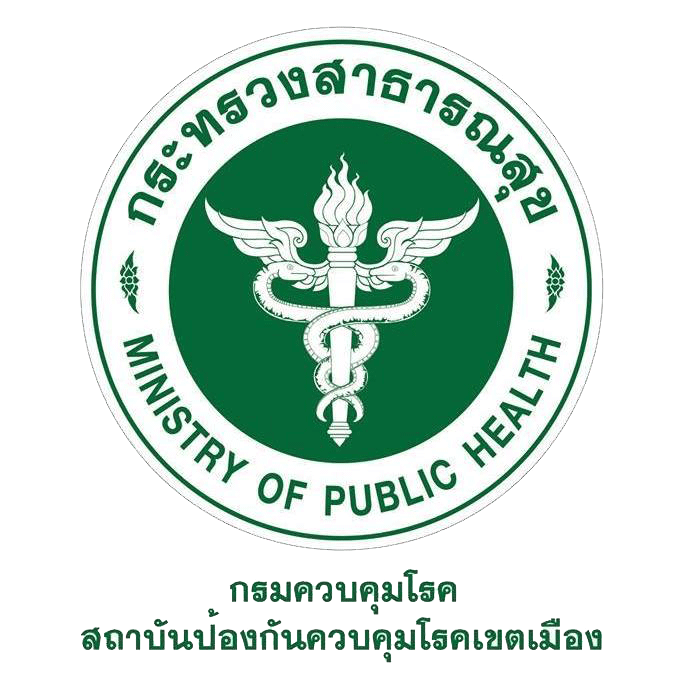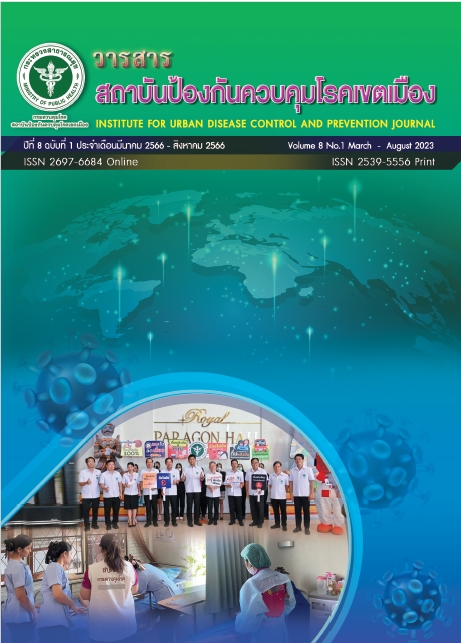การพยาบาลผู้ป่วยโรคหัวใจล้มเหลวเฉียบพลันครั้งแรก: กรณีศึกษา
Main Article Content
บทคัดย่อ
ผู้ป่วยชายไทยอายุ 73 ปี มาโรงพยาบาลด้วยอาการแน่นหน้าอก หายใจลำบาก เหนื่อยมากขึ้นขณะนอนราบ 1 วัน ก่อนมาโรงพยาบาล แรกรับผู้ป่วยรู้สึกตัวดี สัญญาณชีพอุณหภูมิ 36.5 องศาเซลเซียส ชีพจร 68 ครั้ง/นาที ความดันโลหิต 110/80 มิลลิเมตรปรอท หายใจ 18 ครั้ง/นาที ออกซิเจนในเลือด 96% ไม่มีโรคประจำตัว ตรวจร่างกาย ฟังปอดได้ยินเสียง crepitations ทั้ง 2 ข้าง หลอดเลือดที่คอโป่งพอง มีอาการบวมน้ำระดับ 1+ แพทย์วินิจฉัยเป็นภาวะหัวใจล้มเหลวเฉียบพลันครั้งแรก (Acute de novo Heart Failure) รับรักษาไว้ที่หอผู้ป่วยอายุรกรรม ให้การรักษาโดยการจัดการอาการเหนื่อยและบวมบริเวณแขน ขา และให้การพยาบาลตามกระบวนการพยาบาลโดยประเมินภาวะสุขภาพด้านร่างกาย จิตใจ สังคม และจิตวิญญาณ พบว่าปัญหาสำคัญของผู้ป่วยที่มีภาวะหัวใจล้มเหลวเฉียบพลันครั้งแรก คือ ผู้ป่วยขาดความรู้ ความเข้าใจเรื่องโรค การรักษาและการปฏิบัติตัวที่ถูกต้อง การพยาบาลที่เหมาะสมเฉพาะรายบุคคลจึงเน้นการให้ความรู้ตามเอกสารที่จัดทำขึ้นโดยใช้เนื้อหาสอดคล้องกับชีวิตประจำผู้ป่วย อธิบายพยาธิสภาพของโรค สาเหตุการเกิด อาการและอาการแสดงของโรค แนวทาง การรักษา และคำแนะนำในการปฏิบัติตัวที่ถูกต้อง ได้แก่ อาการสำคัญที่ต้องมาโรงพยาบาล การเลือกรับประทานอาหาร การออกกำลังกายที่เหมาะสม การรับประทานยา และการมาพบแพทย์ตามนัด ดังนั้นกรณีศึกษาดังกล่าวจึงเป็นประโยชน์ในการพยาบาลผู้ป่วยภาวะหัวใจล้มเหลวเฉียบพลันครั้งแรก เนื่องจากมีข้อพึงระวังคือ ผู้ป่วยขาดความรู้เรื่องโรคและการปฏิบัติตัว ซึ่งสำคัญต่อการปรับเปลี่ยนพฤติกรรมสุขภาพให้เหมาะสม
Article Details

อนุญาตภายใต้เงื่อนไข Creative Commons Attribution-NonCommercial-NoDerivatives 4.0 International License.
บทความที่พิมพ์ในวารสารสถาบันป้องกันควบคุมโรคเขตเมือง ถือว่าเป็นผลงานวิชาการ งานวิจัยและวิเคราะห์ ตลอดจนเป็นความเห็นส่วนตัวของผู้เขียนเอง ไม่ใช่ความเห็นของสถาบันป้องกันควบคุมโรคเขตเมือง หรือคณะบรรณาธิการแต่ประการใด ผู้เขียนจำต้องรับผิดชอบต่อบทความของตน
เอกสารอ้างอิง
มหาวิทยาลัยเชียงใหม่, คณะแพทยศาสตร์, โรงพยาบาลมหาราชนครเชียงใหม่. คู่มือการดูแลผู้ป่วยหัวใจล้มเหลวเรื้อรังแบบบูรณาการ. เชียงใหม่: คณะแพทยศาสตร์ มหาวิทยาลัยเชียงใหม่; 2559.
สมาคมแพทย์โรคหัวใจแห่งประเทศไทยในพระบรมราชูปถัมภ์. แนวทางเวชปฏิบัติสำหรับดูแลผู้ป่วยภาวะหัวใจล้มเหลวในประเทศไทย. กรุงเทพฯ: ศรีเมืองการพิมพ์จำกัด; 2551.
จริญญา คมเฉียบ. ความสัมพันธ์ระหว่างความรู้ การรับรู้อุปสรรค การรับรู้ประโยชน์ การสนับสนุนทางสังคม การรับรู้สมรรถนะแห่งตน กับพฤติกรรมการบริโภคเกลือโซเดียมของผู้ป่วยภาวะหัวใจล้มเหลว[วิทยานิพนธ์ปริญญามหาบัณฑิต]. กรุงเทพฯ: จุฬาลงกรณ์มหาวิทยาลัย; 2556.
พรพรรณ เทอดสุทธิรณภูมิ. ผลของการใช้โปรแกรมส่งเสริมการดูแลตนเองต่อพฤติกรรมการดูแลตนเองและคุณภาพชีวิตของผู้ป่วยภาวะหัวใจล้มเหลว โรงพยาบาลประจวบคีรีขันธ์. วารสารพยาบาลโรคทรวงอกและหัวใจ. 2558;26:2-14.
พิกุล บุญช่วง. การพยาบาลผู้ป่วยภาวะหัวใจล้มเหลว. พิมพ์ครั้งที่2. เชียงใหม่: โครงการตำราคณะพยาบาลศาสตร์ มหาวิทยาลัยเชียงใหม่; 2541.
Braunstein JB, Anderson GF, Gerstenblith G, Weller W, Niefeld M, Herbert R, et al. Noncardiac comorbidity increases preventable hospitalizations and mortality among Medicare beneficiaries with chronic heart failure. J Am Coll Cardiol. 2003;42:1226-1233.
Van der Wal MH, Jaarsma T, Moser DK, Veeger NJ, Van Gilst WH, Van Veldhuisen DJ. Compliance in heart failure patients: the importance of knowledge and beliefs. Eur Heart J. 2006;27(4):434-440.
กนกพร ขันแก้ว, อัจฉริยา วงษ์อินทร์จันทร์, นลินทิพย์ อ่องสมบัติ, วิชัย เส้นทอง, ชลลดา ทอนเสาร์. ผลของการจัดการรายกรณีต่อความรู้ในการดูแลตนเองของผู้ป่วยภาวะหัวใจล้มเหลวที่เข้ารับการรักษาในคลินิกหัวใจล้มเหลว. วารสารพยาบาลศาสตร์และสุขภาพ. 2562;42:61-71.
ฐิติมา ทาสุวรรณอินทร์, ลินจง โปธิบาล, ทศพร คำผลศิริ. ผลของการส่งเสริมการจัดการตนเองต่อคุณภาพชีวิตและอัตราการกลับมารักษาซ้ำของผู้สูงอายุที่มีภาวะหัวใจล้มเหลว. พยาบาลสาร. 2562;46:108-121.
Taylor SG, Renpenning KE, Geden EA, Neuman BM, Hart MA. A theory of dependent-care: a corollary theory to Orem's theory of self-care. Nurs Sci Q. 2001;14(1):39-47.
Róin T, Á Lakjuni K, Kyhl K, Thomsen J, Veyhe AS, Róin Á, et al. Knowledge about heart failure and self-care persists following outpatient programme- a prospective cohort study from the Faroe Islands. Int J Circumpolar Health. 2019;78(1):1-8.
อรวรรณ ศิลปกิจ. แบบวัดความเครียดฉบับศรีธัญญา. วารสารสุขภาพจิตแห่งประเทศไทย. 2551;16(3):177-185.
สำนักงานคณะกรรมการอาหารและยา [อินเตอร์เน็ต]. นนทุบรี: กองทุนพัฒนาสื่อปลอดภัยและสร้างสรรค์; 2563. รับประทานซีอิ๊วขาวมีโซเดียมน้อยกว่าน้ำปลาจริงหรือไม่; 2563 [เข้าถึงเมื่อ 14 พ.ย. 2565]; [ประมาณ 1 น.]. เข้าถึงได้จาก https://oryor.com/media/checkSureShare/media_specify/845


